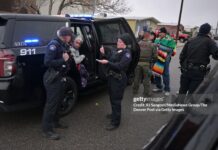Lawmakers in El Salvador have once again extended a state of emergency that suspends certain civil liberties as the government of President Nayib Bukele continues its fight against gangs.
The so-called state of exception, renewed for a 12th time late on Wednesday by the Salvadoran Congress, came into effect last year and has led to around 66,000 arrests in the Central American nation.
It allows arrests without warrants, government access to private communications and detentions without the right to a lawyer.
“We ask that this regime be extended for more time,” Police Director Mauricio Arriaza told reporters ahead of this week’s 30-day extension.
“We need to keep fighting criminal groups, we need to give assurance to Salvadoran families, for their lives and their property.”
The text of the legislative decree stated that the “war against gangs conducted by the government has allowed the Salvadoran population to feel a sense of security”.
While the emergency measures enjoy widespread support in El Salvador, human rights groups and United Nations experts have raised serious concerns around violations of due process, arbitrary arrests and mistreatment of detainees.
Last month, rights groups and the Salvadoran police union told Al Jazeera that a rising number of Salvadorans detained under the state of exception have been “re-arrested” upon release after either being granted bail or having their cases dropped.
That raised fresh fears that Bukele’s government plans to ensure that detainees remain behind bars, particularly in advance of 2024 elections.
“From the beginning, we pointed out that it was not so crazy to think that the state of exception could extend until the elections,” Eduardo Escobar, a lawyer and director of Salvadoran NGO Citizen Action (Accion Ciudadana), told Al Jazeera at the time.
Bukele has said around 80 percent of El Salvador is under the control of criminal gangs, with the state of emergency introduced last year after a wave of murders attributed to the violent groups.
According to official figures, the crackdown has already led to 65,795 arrests, and 2,513 firearms have been seized.
In January, Humans Rights Watch denounced “severe prison overcrowding” in El Salvador’s jails as a result of the surge in detentions.
A month later, Bukele unveiled what he called the largest prison in the Americas region, intended to hold 40,000 suspected gang members – more than doubling the country’s current total capacity of 30,000 inmates across 20 prisons.










